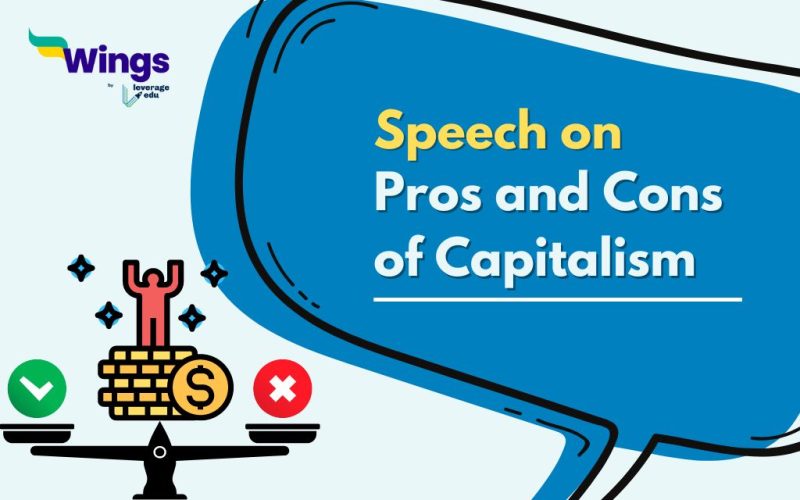Speech on Pros and Cons of Capitalism: An economic system where businesses and industries are owned by the private sector and the motive of individuals and companies is to run for profit is called Capitalism.
It should be noted that in Capitalism, the two important factors of pricing and production are the force of supply and demand. Further, competition as a key driver encourages efficiency and innovation. The ownership of the private sector encourages entrepreneurship which further helps in leading different businesses and industries.
Also Read: Understanding Capitalism: Definition, History, and Significance
5-Minute Speech on Pros and Cons of Capitalism
Ladies and gentlemen, respected faculty and dear friends, today I am here to share with you a speech on the Pros and Cons of Capitalism.
Capitalism is a topic of argument among the experts. Where on the one hand some critics argue that Capitalism heightens inequality and promotes the concentration of wealth. Supporters of capitalism argue that capitalism is advantageous as it provides opportunities for economic growth and personal success.
The capitalistic economy emphasises competition and innovation. Successful entrepreneurs like Jeff Bezos and Mark Zuckerberg are examples of capitalists who started small and achieved monumental success. They attained success due to constant innovations in their respective fields that led to the development of new as well as improved products such as smartphones and electronic gadgets.
Furthermore, the vast range of consumer choices in a capitalist market ensures that people can easily find products and services according to their preferences. Also, the creation of jobs with the expansion of businesses not only helps in employment opportunities but also supports the livelihood of people. Moreover, the intervention of the government in the regulation of the market also helps in lessening the risks of monopolies.
After counting a good number of pros, let us switch to the cons of capitalism. As per the critics, capitalism increases the severity of inequality among people by centring the wealth in a few hands. The salary of a CEO in the private sector to that of an average worker in the same corporation is an evident example of Capitalism. The motive of earning profit with a focus on short-term gains instead of long-term goals can hinder the stability and social responsibility of the private sector. Also, an over-emphasis on profit might lead to unethical practices in business which can harm both the consumers as well as the social environment.
It won´t be surprising to see Capitalism as a failure. Can someone forget the financial crises of 2008, when the markets were associated with high risks? Unfortunately, the unregulated markets which further resulted in a lack of social welfare, weaken the individuals at high risk without any support systems.
In conclusion, Capitalism creates a positive as well as negative impact on society. On the one hand, it helps in promoting small businesses. On the other hand, it weakens the individual´s financial growth. Therefore a balance is required between the two to get the benefits as well as to face the unexpected challenges of Capitalism in society.
Also Read: What is Socialism? Definition, History, and Significance
10 Lines on Speech on Pros and Cons of Capitalism
Let us understand the Pros and Cons of Capitalism in short and simple points:
1. An economic system where businesses and industries are owned by the private sector and the motive of individuals and companies is to run for profit is called Capitalism.
2. The two important factors of Capitalism pricing and production are the force of supply and demand.
3. The capitalistic economy emphasises competition and innovation.
4. The natural inclination of efficiency in the technology sector where constant innovation leads to new as well as improved products such as smartphones and electronic gadgets.
5. The vast range of consumer choices in a capitalist market ensures that people can easily find products and services according to their preferences.
6. Capitalism helps in the expansion of business but also provides employment opportunities and supports the livelihood of people.
7. Capitalism increases the severity of inequality among people by centring the wealth in a few hands.
8. Capitalism motives in earning profit with a focus on short-term gain.
9. Capitalism over-emphasises profit.
10. Capitalism on the one hand it helps in helps in promoting small businesses. On the other hand, it weakens the individual´s financial growth.
Also Read: Bachelor in International Economics: Salary, Jobs, Requirements, Colleges
Also Read: How to Prepare for UPSC in 6 Months?
FAQ
Ans. The pros of capitalism include innovation, production and increased efficiency whereas the cons include lack of government intervention, unemployment and unequalization of wealth.
Ans. The three types of Capitalism are Laissez-faire or free-market capitalism, anarcho-capitalism, and welfare capitalism.
Ans. Capitalism creates a strong as well as a weak impact on society. Where on the one hand it helps in helps in promoting small businesses so on the other hand it weakens the individual´s financial growth.
Ans. The good side of capitalism is that it promotes innovation and small businesses.
Related Blogs
| Sectors of the Indian Economy Class 10 Notes and NCERT Solutions | PhD in Economics in Europe |
| Class 11 Introduction To Microeconomics | Everything You Need to Know About Economics Class 11 |
For more information on such interesting speech topics for your school, visit our speech writing page and follow Leverage Edu.
 One app for all your study abroad needs
One app for all your study abroad needs













